There are so many benefits of shea butter for skin that it’s almost hard to list them all. This natural off-white butter has been a skincare staple for many years simply because it’s so incredibly versatile and nourishing for skin.
One of the best parts about shea is that anyone can benefit from it. There isn’t a skin type that shouldn’t use it, although it may be extra beneficial for those with dry or mature skin.
To jump right in, here’s more about shea butter and the top reasons your skin will love it. (Plus, how to choose the right kind of shea butter).
What is Shea Butter? A Skincare Superfood
Shea butter is made from the nuts of a tree known as Vitellaria paradoxa (formerly Butyrospermum parkii). These trees are native to West and Central Africa, and most shea butter is still sourced from these regions.
The traditional way to make shea butter is by first harvesting the nuts from the trees and then removing the outer shells. After this, the inner part is crushed by hand and roasted to bring out the fat.
The fatty part of the nuts is what forms the butter, and it has to go through a few more steps (like being kneaded in water) to fully separate it from the rest of the nut. Once this is accomplished, the end result is an off-white or ivory “butter” that is solid at room temperature.
Unrefined shea butter (the best kind) tends to have a mild nutty or earthy smell. It easily melts on contact with your skin, which makes it great to use on its own or to add to skincare products.
The benefits of shea butter for skin have been valued for a long time. There are reports that it was even used by Cleopatra and the Queen of Sheba thousands of years ago! Of course, it has also been a staple in African cultures where it’s used as a cooking oil as well as for skincare.
The Unique Composition of Shea Butter
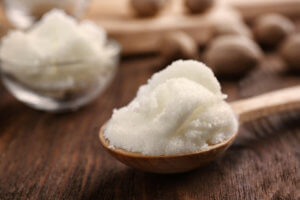
Shea butter is full of nutrients and plant compounds that provide “superfood” power for your skin.
The main components of shea are fatty acids that give it rich, nourishing properties. Oleic acid and stearic acid are present in the highest amount, accounting for about 80-90% of the total. Smaller amounts of linoleic, palmitic, and alpha-linoleic acids are also present.
Two outstanding skin vitamins that shea butter is rich in are A and E. Both act as antioxidants to promote healthy skin cell growth and regeneration. Vitamin E is also extremely protective for your skin (more on that later), and vitamin A has anti-aging power (more on that later, too).
It may surprise you to learn that shea also possesses antioxidants that are very similar to those found in green tea.
Known as catechins, this group of antioxidants consists mainly of gallic acid, gallocatechin, epigallocatechin, and epigallocatechin gallate. Other types of antioxidants are present as well, although the amount goes down the more shea butter is processed.
Top Benefits of Shea Butter for Skin (and Hair!)
Deeply Nourishing and Moisturizing
One of the top uses for shea butter is as a natural moisturizer. Its unique fatty acid makeup allows it to moisturize skin, lock in moisture, and nourish dry or damaged skin.
While certain oils simply sit on top of your skin and keep existing moisture in, shea has the added benefit of actually adding more hydration. This could be partly because of the linoleic acid found in the butter, which helps it to penetrate into your skin and improves skin barrier function.
Shea butter is also considered an emollient, which makes it extra supportive for dry skin. This is because emollients fill in the spaces around skin cells, making your skin look less dry and flaky. They also soften and smooth out skin, all while keeping it moisturized.
Fights Signs of Aging
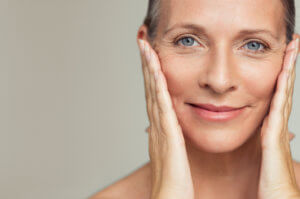
The vitamin A, vitamin E, and other antioxidants in shea butter all have anti-aging properties.
Antioxidants in general help protect your skin from premature aging by fighting free radicals that do damage at the cellular level. They also encourage the regeneration of skin cells to keep your complexion looking fresh and youthful.
Vitamin A is a particularly powerful antioxidant for your skin. It and its derivatives can diminish signs of aging, including wrinkles and age spots, and help protect your skin from UV damage.
Shea butter also contains compounds known as triterpenes that support the production of collagen— the important skin protein that helps keep your skin looking thick, plump, and wrinkle-free.
Calms Red or Inflamed-Looking Skin
Another one of the top benefits of shea butter for skin is its anti-inflammatory nature. In fact, studies have shown that it has remarkably powerful anti-inflammatory properties and even contains compounds that have anti-tumor potential.
You can make use of this benefit to calm redness and even out skin tone. Shea is also helpful for itchy or mildly irritated skin because of its natural soothing properties.
In addition, some research has looked at whether shea butter can help with common inflammatory skin issues. Studies have been limited, but the results so far are very positive.
For example, one study found that a botanical cream containing shea butter was effective at reducing the symptoms of mild to moderate eczema. Another found that a cream with shea butter extract was equally effective for relieving atopic dermatitis as a conventional cream.
Helps Ease Bug Bites, Burns, and Sunburn

Because shea butter can calm inflammation and promotes skin barrier integrity, it can be very helpful for minor skin ailments and damaged skin. It also provides a physical barrier that helps protect your skin as it heals.
Now, you don’t want to apply it to deep wounds or to fresh burns. Especially in the case of burns, this can slow the healing process because applying an oil right away traps heat in your skin and makes the burn more painful.
However, you can put a light layer of shea over a sunburn, semi-healed first-degree burn, or itchy bug bites. It will protect and soothe your skin all on its own, and you can also add in some aloe vera (particularly for burns) or a drop of an essential oil like lavender.
Offers UV Protection and a Mild SPF
You already know that antioxidants have a general protective effect for your skin, but let’s talk about a specific one: Vitamin E.
Vitamin E is one of the main reasons shea butter has skin benefits against UV rays. Too much exposure to UV radiation causes something known as photodamage. Photodamage occurs deep in the tissues and cells of your skin and results in visible signs of aging like wrinkles, dark spots, thin skin, etc.
Multiple studies have shown that vitamin E specifically helps protect your skin from UV-induced photodamage. It may even be powerful enough to help prevent DNA photodamage, which is protection at the deepest level!
As an added bonus, shea butter also has a mild SPF factor of 3-6. Obviously, this isn’t enough for it to be a sunscreen on its own, but it does give your skin an extra layer of protection.
Has Antimicrobial Properties (and May Fight Acne)
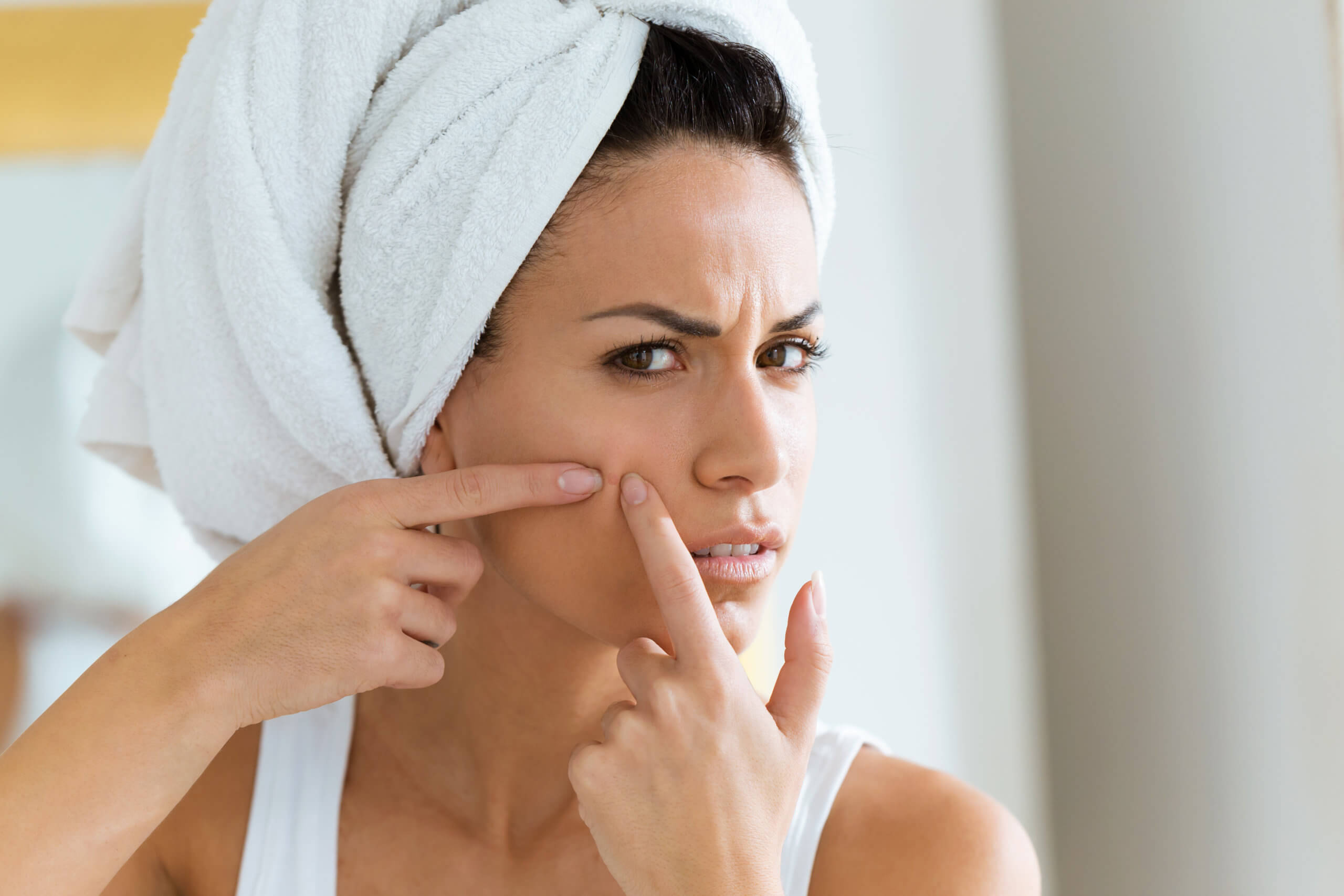
Shea butter has shown both antibacterial and antifungal properties in studies. It hasn’t necessarily been tested against all the possible strains that might cause skin problems, but it does have potential for keeping your skin clear.
More specifically, shea butter may have potential to help acne-prone skin. This is because of its unique fatty acid makeup as well as its bacteria-fighting properties (not to mention its anti-inflammatory effects).
While you might think that a fatty butter would be bad news for breakouts, the fatty acids in shea can actually help to balance oil production in your skin. If you find it to be too “heavy” on its own, try mixing with a lighter ingredient like aloe gel or evening primrose oil.
May Reduce the Appearance of Scars & Stretch Marks
Minimizing the appearance of scars and stretch marks are two more benefits of shea butter for skin, although more research is needed for “official” confirmation.
It’s thought that the vitamin A content of shea, and its ability to help skin cells regenerate, can fade unwanted skin marks. Lab studies have also shown that shea butter may help prevent the formation of keloids (a type of scar tissue), which could help diminish stretch marks, acne scars, etc.
Keep in mind that it’s unlikely stretch marks or certain scars will go away entirely. However, by applying shea butter daily, you may be able to fade these areas of skin and make them less noticeable.
Good for All Skin Types and Not Allergenic
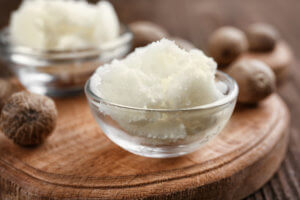
As mentioned earlier in this article, shea butter is an excellent skincare ingredient because all skin types can benefit from it. Yes, it is particularly nourishing for dry (or mature) skin, but it shouldn’t make oily or combination skin feel greasy.
The only “downside” to shea is that it can feel a little heavy on its own if your skin tends to be on the oily side. If you find this to be the case, combine it with lighter ingredients before using. (Aloe gel is particularly good for oily skin.)
Something else to note about shea butter is that there are no documented cases of allergic reactions to it, despite the fact that it technically comes from a tree nut. Of course, if you do have an allergy to tree nuts, it’s still a good idea to start with a tiny amount of shea and see how your skin reacts.
However, in general, even people with tree nut allergies have been able to use shea butter with no problems.
Helps Prevent Hair Breakage
Shea butter doesn’t just have benefits for your skin. It’s also a nourisher and moisturizer for your hair and scalp and may help to strengthen hair strands.
When used in something like a hair mask, shea provides hydration that keeps hair strands from getting brittle. This may make hair stronger and less likely to break, which is a common problem in dry or depleted hair. The nutrients in shea also help to restore hair that has been over-styled and over-heated.
There’s no research specifically on shea butter and hair strength. However, a chemically similar plant in the same family did show an ability to prevent hair breakage and restore hair.
May Fight Dandruff
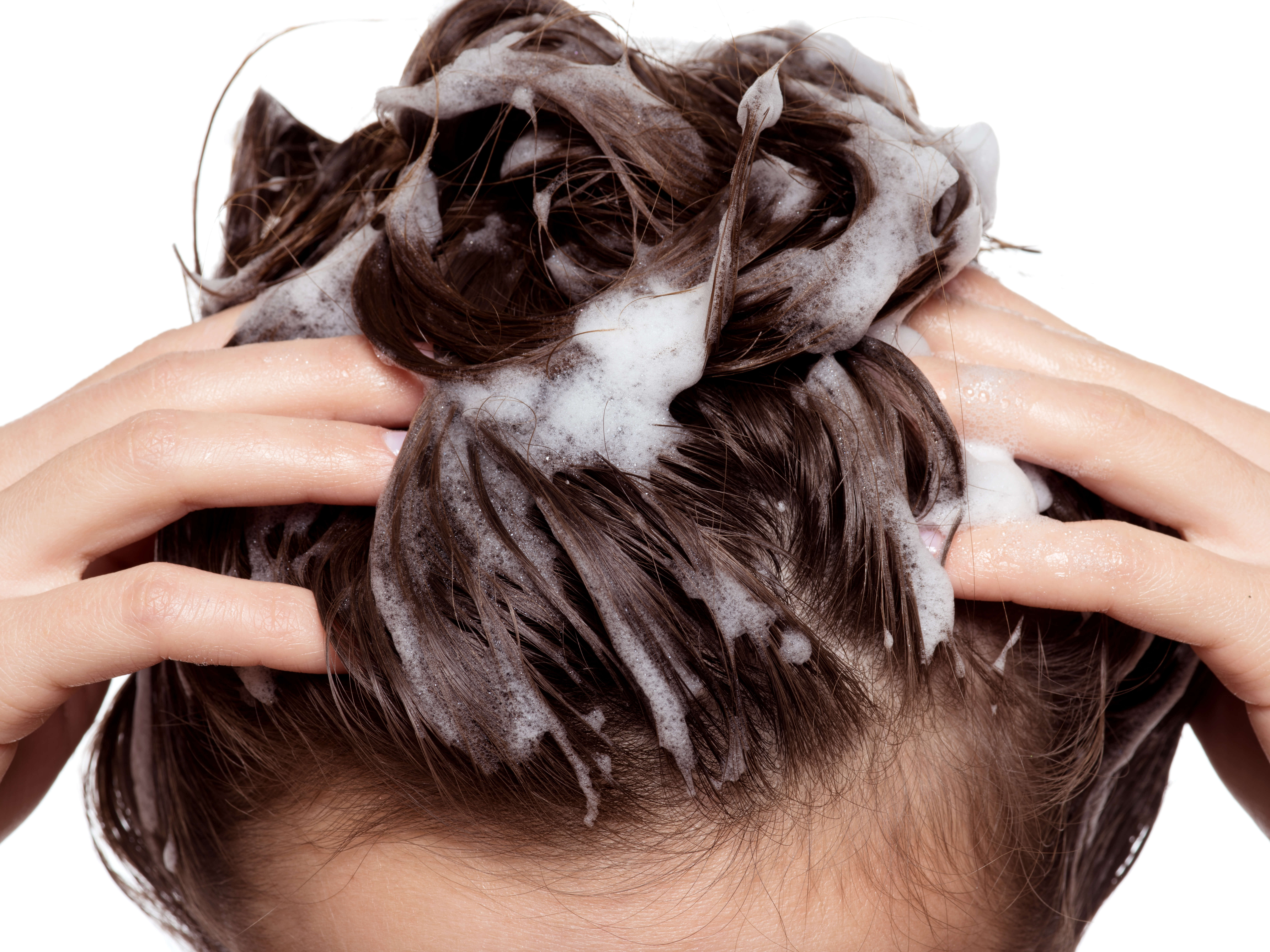
Shea butter has a lot of potential for treating dandruff. It helps to moisturize an itchy, dry scalp and has antifungal properties that may be able to fight the yeast-like fungus (malassezia) that can contribute to dandruff.
Some studies have confirmed that shea butter can effectively be used as part of a moisturizer to treat atopic dermatitis. (And dandruff is considered atopic dermatitis on your scalp.)
You can try shea butter on its own as a “scalp mask” that you rinse off. Or rub a very small amount of it into your scalp after washing your hair.
How to Choose the Right Shea Butter
When buying shea butter, it’s important to realize that not all products will have the same quality.
One of the best things you can do is to look for unrefined (or raw) shea butter. Refined shea butter is put through processing that deodorizes it and/or makes it whiter. However, this also strips it of many of the nutrients and compounds that make it so beneficial in the first place.
In addition to this, shea butter is sorted into different types based on quality. Grade A is the highest quality choice and contains the most active components. Grade F is the worst and not even suitable for human use. In between are Grades B, C, and D.
Another consideration when buying organic shea butter is to make sure that no pesticides, chemicals, etc. were used either during the growing or manufacturing processes. This ensures toxin-free skincare that won’t be doing your skin any harm.
The bottom line: To get the maximum possible benefits of shea butter for skin, look for an unrefined, organic, Grade A product.
Shea for Your Skin: Age-Defying Dream Cream 
For a beautifully moisturizing cream that fights signs of aging like wrinkles, fine lines, and age spots, look into the Age-Defying Dream Cream from Purity Woods that contains organic, unrefined shea butter.
This cream pairs the outstanding power of shea butter with other superb moisturizers like aloe vera, mango seed butter, and coconut oil. It also adds in the best natural vitamin C and antioxidant ingredients to boost collagen and quickly make skin look brighter and younger.
The entire formula is USDA Certified Organic and works well for all skin types. It also contains only pure botanicals proven to have major skin benefits.
Look into the Age-Defying Dream Cream here, and be sure to add shea butter to your skincare routine!


